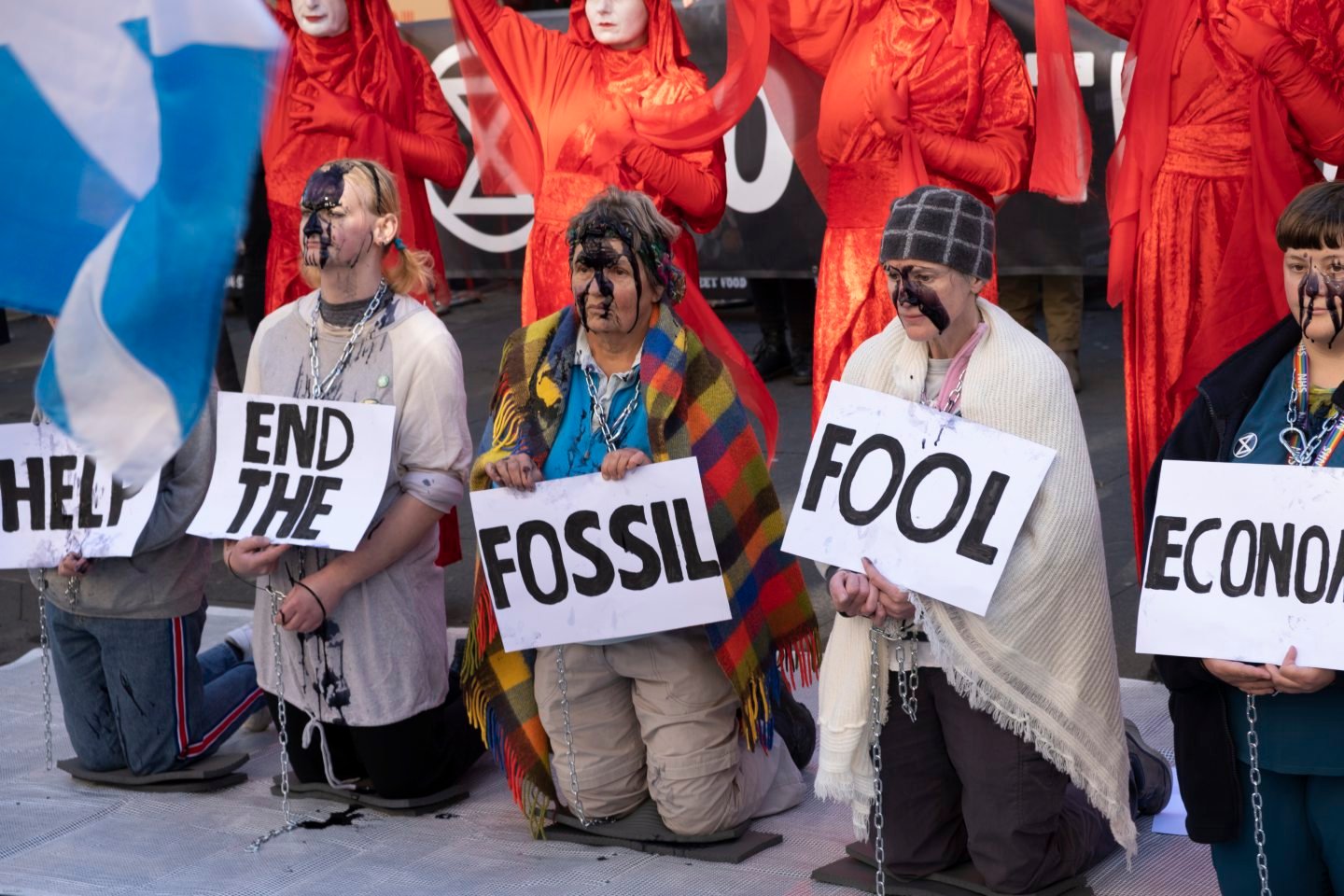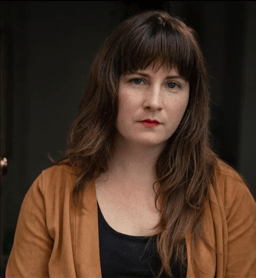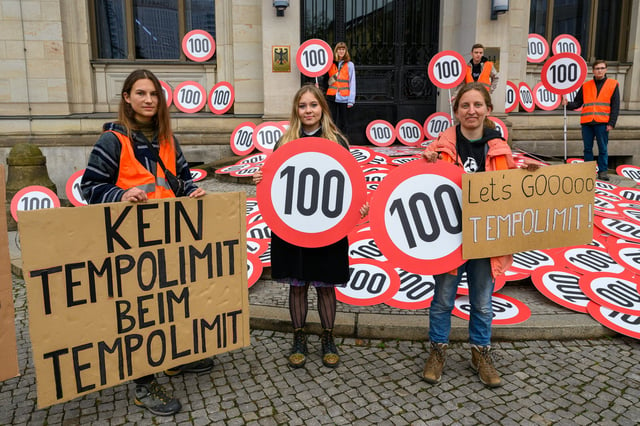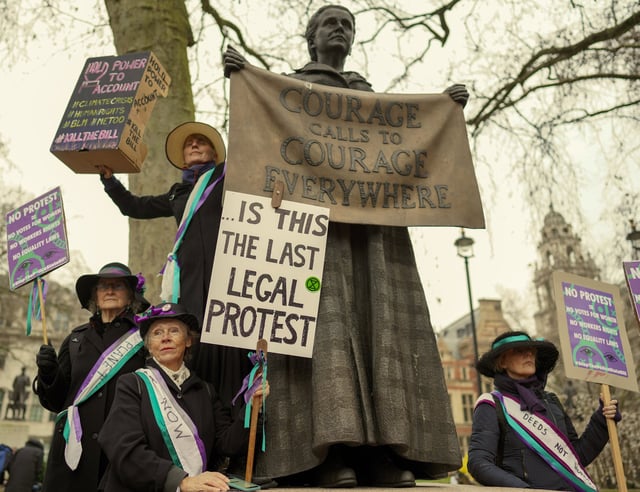
Photo: A climate protest in the UK in 2022. Credit: Andrew Dykes
On a blustery day in October 2022, two activists with the group Just Stop Oil scaled a bridge over the River Thames in England, forcing traffic to reroute. It was an effort to pressure the U.K. government to stop production of oil in response to the climate crisis. At the same time, on another highway, Dr. Habiba Hajallie’s car hydroplaned and crashed into a traffic barrier. As two drivers stopped to help her, a BMW swerved across multiple lanes and lost control, killing Hajallie and another woman.
According to a report published by the Frontier Centre for Public Policy, a Canadian think tank, the protests are what killed these women, and their deaths, along with other traffic incidents the report ties to climate protests, are justification for Canada to import the United Kingdom’s recently passed anti-protest legislation. “Canada should follow the British model and insist now on serious sentences for eco-extremists who cause disturbances intended to intimidate the public,” Frontier senior research fellow Joseph Quesnel writes in a new report, titled “The Deadly Fruits of Climate Change Alarmism: The Looming Eco-Extremist Threat and Why We Must Stop Ignoring It.”
Published March 19, the report argues not only that Canada needs to adopt U.K.-style anti-protest legislation, but also that the Canadian government, media, and educational systems should stop ringing alarm bells about the severity of the climate crisis; that universities should disassociate from academics who “promote” unlawful acts like property damage in the name of protecting the environment; and that intelligence agencies should add environmental organizations to their list of extremists and “start monitoring these groups closely.”
Habib Hajallie, Habiba’s brother, learned how his sister’s memory was being repurposed via an interview request from Drilled. He was upset. “Their deaths had NOTHING to do with the protesters,” he said. “The deaths were caused by terrible weather conditions in the rain, issues with the road and, crucially, reckless driving by the person who hit them. Delays (if there were any) from the ambulance would not have made any difference to the truly horrendous outcome.”
“Me and my family feel the tragic loss of my sister every single day,” he wrote. “Habiba was a young doctor that would go above and beyond for her patients, she was a kind and giving soul - above all else she was a wonderful mother to her daughter.”
“Please stop these awful people from using the loss of my sister to further their agenda, it is disgusting to see them use my sister's name in this way,” he continued. “Habiba strongly believed in environmental causes and the sustainability of the world that her daughter would grow up in.”

After initially declining to respond to questions and accusing Drilled of pursuing a “bad faith smear attack piece,” the report’s author Quesnel shared a response via email. “To start, I extend a sincere and heartfelt condolence to the families and friends of Dr. Habiba Hajallie and Lisa Webber,” he wrote, referencing the second person killed in the crash. “Good faith effort was made without ultimate success to contact relevant authorities and witnesses to the tragedy on the M20 in October 2022.” Absent that, Quesnel wrote that he relied on “good sense” and “credible news reports that were not contradicted or retracted.”
The report appears to draw on an article from the conservative-leaning Daily Mail newspaper, which quoted another man injured in the crash who believed the protesters had inadvertently caused the crash. The report also stated that Hajallie’s ambulance was delayed 40 minutes. Days after the incident, the South East Ambulance Service denied that the ambulance was delayed in an interview with a journalist for Open Democracy, a UK-based nonprofit media outlet.
“It bears mentioning no statement in the Frontier Centre study stated or implied direct responsibility or criminal culpability,” Quesnel wrote in an email to Drilled. The Frontier Centre fellow added that he believed Drilled was attempting to “exploit this terrible tragedy for the sake of providing cover for eco-extremists who commit reckless acts placing human life in danger.”
In an email, a spokesperson for Just Stop Oil told Drilled, “Just Stop Oil supporters are acting to try to protect life as our leaders license more oil and gas, whilst the world slams through irreversible tipping points that threaten all of our lives.” The spokesperson added, “This story is indicative of how the fossil fuelled media manipulates reality to deceive the public in order to protect the interests of the powerful corporate interests driving this destruction. We extend our heartfelt condolences to Habib Hajallie as well as all the friends and families affected by this terrible accident.”
The Frontier Centre for Public Policy is the latest of numerous right-wing think tanks around the world to encourage policymakers to crack down on environmental defenders. Policy Exchange, the think tank that first pushed the UK’s anti-protest law, is a former partner of Atlas Network, a nonprofit that connects over 500 partner think tanks to exchange ideas about promoting “free market” policies and has received funding from fossil fuel interests at various points in its history. The Frontier Centre is a current partner of Atlas Network.
According to director of marketing and communications for Atlas Network, Adam Weinberg, partnership qualifies an organization to apply for grants, awards, and competition opportunities, as well as the option to attend various in-person and virtual trainings and events. Weinberg noted that Frontier Centre staff had not been to an in-person Atlas event since 2019, but have participated in online events and trainings since then. “Our partners are independent; they don't need our permission or approval to work on anything they believe is important in their country,” he said. “And we do not put ourselves in the role of deciding policies or priorities for other countries. We simply dedicate our modest support to run alongside those who are seeking to advance individual rights and free enterprise in a way that works for their local context.”
Many of the network’s current and former partners have lately taken an interest in criminalizing environmental activism in their respective countries.
Five years ago Policy Exchange issued its own report encouraging a crackdown on environmental activists. The environmental group Extinction Rebellion had been staging large-scale protests that disrupted the day-to-day activities of Britons. Policy Exchange’s report, titled Extremism Rebellion, advised, “Legislation relating to public protest needs to be urgently reformed in order to strengthen the ability of the police to place restrictions on planned protest.”
In the years that followed, the UK passed its Policing Act in 2022, which gave law enforcement a range of new powers to restrict protest and created new crimes of public nuisance and “willful obstruction of the highway.” Then, the Public Order Act of 2023 included among its provisions more new crimes, for people who lock themselves to an object, block traffic, or interfere with “key national infrastructure.” The assertion that environmental activists were delaying emergency services was used as a justification for the legislation. At a garden party hosted by Policy Exchange that year Prime Minister Rishi Sunak credited the think tank with helping his lawmakers draft the anti-protest legislation.
Now Frontier is advising that Canada follow suit. “The United Kingdom provides a ‘good’ model for Canada to follow to begin recognizing the eco-extremist threat by passing laws and criminalizing unlawful tactics that intimidate and endanger lives,” Quesnel wrote in the Frontier Centre report. As in the UK, the report adds, “Canadians should be able to report eco-extremists to CSIS [the Canadian Security Intelligence Service] and/ or the RCMP [Royal Canadian Mounted Police] and have those reports taken seriously.”
Think tanks linked to Atlas Network in the U.S. (the Heartland Institute and American Legislative Exchange Council, among several others), Australia (Centre for Independent Studies), and Germany (Prometheus Institute) have also used rhetoric connecting land defenders to terrorists, and accusing protestors of delaying emergency services as part of a successful push for more aggressive policing of activists, and laws that increase jail time and fines for those participating in nonviolent civil disobedience.
Weinberg denied involvement by the organization in any of this work, including the Frontier Centre’s study. “Atlas Network has not provided a grant to the Frontier Centre for more than a decade, so we had no knowledge of or role in this report,” he said.
“Our independent partners are countering government overreach and corruption and advancing individual rights, including freedom of speech and assembly, throughout the world,” he said. “These nonprofits are independent of our organization and each other—it is up to each of their respective staffs and leadership to decide how or if they work together and if they decide to engage with our grants, training, conferences, etc.”
The Frontier Centre for Public Policy did not respond to questions from Drilled.
The severity of the climate crisis is not the only well-researched fact that the Frontier Centre denies. The think tank has made headlines in the past for questioning the devastating impact of extensively documented abuse at Canada’s system of residential schools, which were designed to eliminate Indigenous cultures. When scandal erupted in 2021 after evidence of unmarked graves of children was discovered at one former school, the Frontier Centre went so far as to call the discovery a “hoax.” It has been joined in such denialism by at least one current partner of Atlas Network in Canada, the Fraser Institute.
Canada’s climate movement is led by Indigenous people fighting to protect their land-based lifeways from erosion by fossil fuel infrastructure. Indigenous land defenders have built tiny houses, blockaded roads, and occupied encampments in the pathways of pipeline projects, and even blocked railways in 2020, to pressure the government to stop construction of fossil fuel infrastructure on their lands. To the Frontier Centre, such actions amount to terrorism, which the think tank defines as including actions that “severely disrupt essential services,” when carried out to advance a cause.
The Frontier Centre isn’t the only partner of Atlas Network that has weighed in on how Canadian policymakers should respond to Indigenous-led fossil fuel protests. The MacDonald-Laurier Institute has encouraged Canadian leaders to not only use police force, but also deploy counterinsurgency-style strategies that seek to capture the hearts and minds of community members. First Nation opposition to projects could be neutralized if they were offered ownership stakes in the projects or larger revenue shares, the institute recommended in a 2013 report — a tactic known as “redwashing.” Those who could not be convinced to become allies to the industry, MacDonald suggested, could be discouraged via criminalization.
In the years since, Canada and its fossil fuel companies followed many of the Institute’s recommendations. Meanwhile, the Royal Canadian Mounted Police created a special unit dedicated to protecting infrastructure like pipelines, began enforcing injunctions requiring land defenders to abandon their own land, and at times violently evicted resistance camps.
According to the Frontier Centre’s report, those actions have been insufficient, and it’s not just illegal activity that needs to be attacked, but also ideas. “Exaggerated beliefs about climate change,” which the report also ties to “pro-Indigenous” sentiments, the Indigenous land-back movement, and movements for Palestinian liberation and against white supremacy, are driving increasingly extremist tactics. Academics like Adreas Malm, author of How to Blow Up a Pipeline, are normalizing the idea that the climate crisis could justify destroying infrastructure, according to the report.
The report recommends that academic institutions be purged as well. “Canadian universities have become cesspools of eco extremist thought and potential recruitment grounds for extremist organizations,” it says. “Academic institutions must dissociate themselves from eco-extremist academics who promote unlawful acts, such as property destruction, arson and sabotage of energy infrastructure.”
Atlas Network spokesperson Weinberg told Drilled, “There are no policy prescriptions provided by the Atlas Network to our partners. We do not have grant categories or policy positions about energy, the environment, climate change, or Indigenous communities.” He added, “Many of our partners have decided locally that their work should advance the individual rights of people in Indigenous communities.”
Nancy MacLean, a professor of history and public policy at Duke University, who dug into Atlas Network as part of the research for her book Democracy in Chains, said that organizations like Frontier should be viewed as serving monied interests. “For four decades now, interested corporations and excessively wealthy right-wing donors have funded operatives at groups like the Frontier Center and the transnational Atlas Network of dark-money backed organizations of which it is one of many,” she said in an email. “No one should treat these organizations or their output as credible. They exist to advance private interests at the expense of the public good.”
In the UK, the Just Stop Oil protesters ultimately bore the brunt of the years of work by Policy Exchange and right-wing lawmakers. Morgan Trowland and Marcus Decker, the protesters who suspended themselves from the bridge, were sentenced, respectively, to three and two years in prison, under the new Public Nuisance offense. They were the longest-ever UK sentences for nonviolent climate protests, according to the activist group.
“It is encouraging that the morally irresponsible eco-extremists who suspended themselves on Dartford Crossing in 2022 were both charged and given historic sentences for their criminal nuisance behaviour," Quesnel said via email.
In Canada, it’s people like Freda Huson, whose traditional name is Howilhkat, that have the most at stake. Huson, who is Unist’ot’en, has spent more than a decade occupying land where corporations have sought to build fossil fuel infrastructure, including the Coastal GasLink Pipeline, and has repeatedly experienced aggressive police and courtroom tactics. “They make a justice system to suit their billion dollar industries, and they don’t care about the average person,” she told Drilled. “They don’t care that they’re destroying the land. They don’t care that they’re increasing global warming, and they’re not going to see it until they’ve got no water and no food.”
Meanwhile, the Frontier Centre’s ideas have also crossed oceans, with the think tank’s former senior policy analyst, David Seymour, now serving as a New Zealand Member of Parliament, and leader of the right-wing ACT Party. Seymour, who has Maori heritage, is leading an effort to rewrite the principles underpinning New Zealand’s founding treaty, which grants Maori people sovereignty and specific rights — part of a larger push to roll back Indigenous rights in the country.






